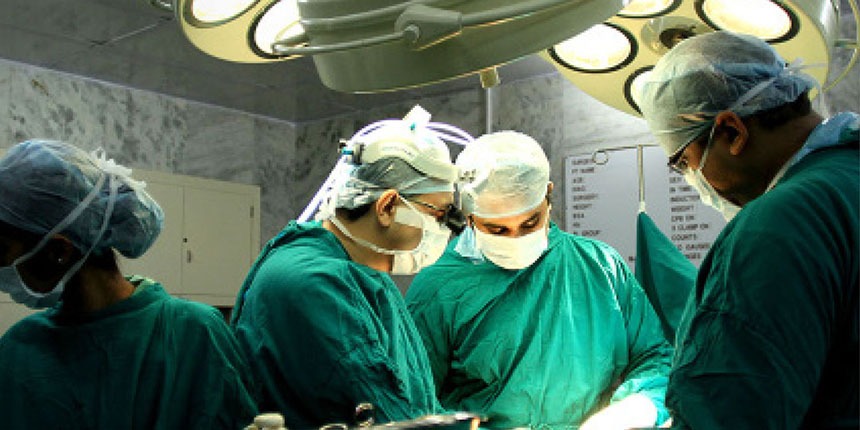‘No capitation fee’: NMC issues draft guidelines on MBBS, MD, MS fees
Abhay Anand | May 26, 2021 | 11:36 AM IST | 4 mins read
Medical Education will be “not-for-profit” and hospital expenses can’t be covered with MBBS or PG student fees, say NMC guidelines.
NEET 2026 Free Mock Test with Solutions
Download the NEET 2026 Free Mock Test PDF with detailed solutions. Practice real exam-style questions, analyze your performance, and enhance your preparation.
Download EBook
NEW DELHI: The National Medical Commission (NMC) has barred medical colleges from charging capitation fees. In its draft fee fixation guidelines released on May 25, NMC has asked medical colleges to adhere to the "not-for-profit" principle for the determination of fees for MBBS and postgraduate courses.
Fees will be based mainly on the “operating cost” of the institution. What can be included and excluded from the computation of this “operation cost” occupies most of the seven-page draft guidelines. The fee can be fixed “for a block” of three years or annually. The guidelines allow colleges to charge security deposits or caution money provided they are not “exorbitant” and "development fee at the rate of 6% to 15% of the operating cost can be added for meeting the development expenditure for growth and expansion of the medical college".
The NMC’s draft fee fixation guidelines for medical colleges is in public domain for comments and suggestions.
With all MBBS admission tests and processes rolled into the single, standardised, government-administered National National Eligibility-cum-Entrance Test (NEET), medical colleges had already been finding it difficult to charge capitation fees. However, this also resulted in a sharp increase in tuition fees, especially at private colleges.
Medical college operating cost
As per the NMC guidelines, “The operating cost should primarily form the basis for the determination of fees for medical education. The operating cost should be arrived at on the basis of the last annual audited accounts of the institution”.
For a newly-established college, fee should be based on the fee structure of the most recently established medical colleges in the state, whose audited balance sheets are available.
Fees for PG courses could be on the basis of salaries of teaching faculty and other directly identifiable expenses.
"The fees determined on the basis of these guidelines should not be more than the existing fees determined by the State Fee Regulatory Authority," says the National Medical Commission document. Plus, existing policies on government quota seats and seats for which fees are already regulated will continue.
Exception for COVID-19 year
The NMC has given an exception to colleges established in 2020-21. Due to the COVID-19 pandemic, most colleges had to suspend physical classes and expenses such as hostel maintenance, mess expenses and other expenses directly related to students decreased, while other expenses such as hospital running expenditure, salaries and overtime allowances of medical staff and doctors went up. The document says: “The expenses of 2020-21 will not accurately depict the actual expenditure which a medical college has to bear in a normal year. In such cases, the State Fee Regulatory Authority may consider the average audited financial result of the previous three years, with appropriate inflation adjustment.”
The total sanctioned roll-strength will be a factor in determining the cost-per-student for both MBBS and PG courses.
The commission has also left the State Fee Regulatory Authority and medical colleges to decide whether the fee for MBBS and PG courses will be fixed for a “block of three years” or revised annually. “The fee fixed for a student joining a college in a particular year should remain the same for the entire duration of his study in the college, subject to inflation adjustment, as considered appropriate by the State Fee Regulatory Authority,” adds the NMC document.
Hospital expenses not part of fee
The NMC has also stated that medical colleges cannot add the cost of running a hospital to the cost for providing medical education. Only the portion of hospital resources used for teaching can be factored in while computing fees. However, if a hospital is running at a loss, then the State Fee Regulatory Authority can allow up to 20 percent of the costs of the hospital to be counted as part of the operating cost of the medical college.
Even the stipends paid to PG students on residency cannot be included in the operation cost of the medical college and will be counted as the hospital’s expenses.
As per the guidelines, salaries of the teaching staff and other non-teaching staff should be taken into account for the purpose of determination of fees for medical education.
Security deposit, development fee
The NMC has also asked medical colleges to not charge exorbitant amounts as a security deposit or caution money. As per the guidelines, “Such deposits are normally refundable and are invested in fixed deposits on which interest is earned. The amount of deposits should not be taken into account for calculating the fee. The amount of such deposits should not be exorbitant.”
It has also suggested that the state authority fix ceiling rates for all such deposits and require colleges to disclose the break-up of such deposits on their websites. Also, interest earned from investing security deposits have to be deducted from the “operation costs” before determining fees.
The NMC guidelines allow colleges to raise 6% to 15% of the operating cost as development fee from fees “for meeting the development expenditure for the growth and expansion of the medical college”. It adds that a college rating system would encourage colleges to actually use this fund for development and that, in turn, will allow them to charge more.
Write to us at news@careers360.com.
Follow us for the latest education news on colleges and universities, admission, courses, exams, research, education policies, study abroad and more..
To get in touch, write to us at news@careers360.com.